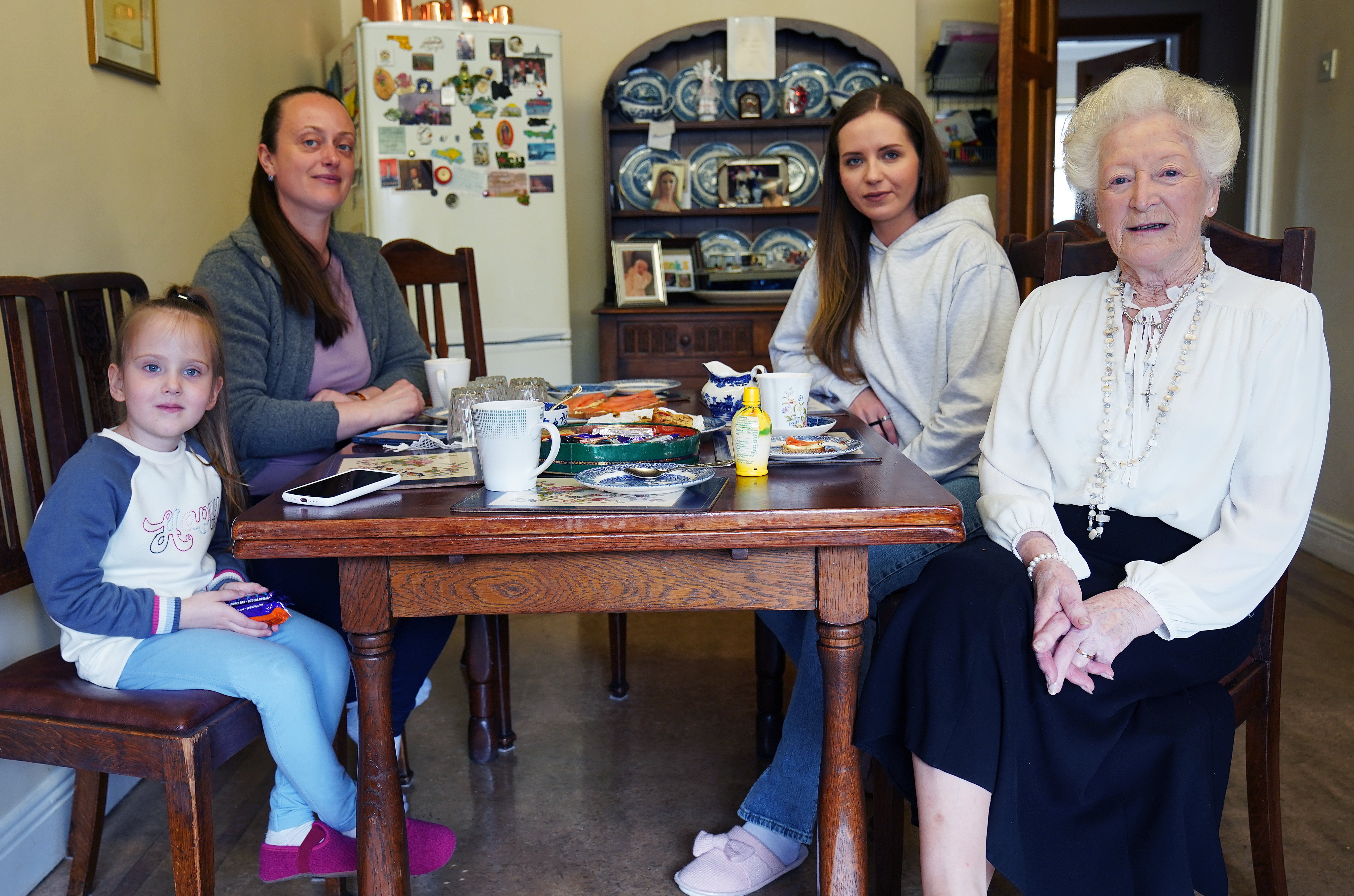The Ukrainian family making a home with an 87-year-old Irishwoman
The family travelled from badly-hit Kharkiv to Lviv, and then onto Poland, before making it to Ireland.

Your support helps us to tell the story
From reproductive rights to climate change to Big Tech, The Independent is on the ground when the story is developing. Whether it's investigating the financials of Elon Musk's pro-Trump PAC or producing our latest documentary, 'The A Word', which shines a light on the American women fighting for reproductive rights, we know how important it is to parse out the facts from the messaging.
At such a critical moment in US history, we need reporters on the ground. Your donation allows us to keep sending journalists to speak to both sides of the story.
The Independent is trusted by Americans across the entire political spectrum. And unlike many other quality news outlets, we choose not to lock Americans out of our reporting and analysis with paywalls. We believe quality journalism should be available to everyone, paid for by those who can afford it.
Your support makes all the difference.Irishwoman Phyllis McDonagh is, according to an apron that hangs in her kitchen, the “World’s Greatest Hostess”.
So when refugees began fleeing war-torn Ukraine, she was always going to help.
Sitting around the large wooden table in the 87-year-old’s Dublin home are Viktoria Kasianenko, 39, who was driven with her four-year-old daughter Barbara Yevlakhova and step-daughter Anna Yevlakhova, 32, to join her husband Yury, 58, in Dublin.
The five-day journey, which saw them travel from badly-hit Kharkiv to Lviv and then onto Poland, has become all too familiar in recent weeks as more than 7,000 refugees from embattled Ukraine arrive in the Republic of Ireland.
Viktoria, Barbara and Anna came to Dublin to join Yury, a watchmaker who has worked for Mrs McDonagh’s son in the city centre since last September.
We are very grateful to the family for hosting us now in Ireland. We can feel the support from everyone, from all the family members
But, in doing so, family and friends – including Viktoria’s father – have been left behind.
“From the first days, the bombs were falling and we heard the shooting,” Viktoria told PA news agency.
Like thousands of others, the trio were forced to hide in basements as soon as sirens blared to announce incoming Russian shelling.
“We were like this for a few days,” she said through a translator.
“One morning, we woke up and we decided… we were in the basement and we decided we cannot do it anymore.”
The three went to a train station to escape but found it “completely full”.
Viktoria said: “We didn’t manage to get on the train, and then we decided we’re going to sleep on the train station and just to find any way to get out of there.”
From Poland, a Scottish woman criss-crossing the continent to help Ukrainian refugees drove them all the way to Ireland.
While they are now safe, Viktoria and Anna struggle to describe the fear they have for their country.
“First of all, of course we are happy that they are now in a safe place. And we are very grateful to the family for hosting us now in Ireland. We can feel the support from everyone, from all the family members,” Viktoria said.
“We are sad and there’s no words can explain how we feel because we left absolutely everything there.
“Nobody knows what to expect and when we going be able to move back.
“Of course, it’s the first and the main wish to go back to Ukraine and to see our family and friends and relatives. But nobody knows what to expect.”
Barbara, who is not yet in school, is adjusting to her new surroundings.
She messed around with the keys of Mrs McDonagh’s piano while her mother talked.
Viktoria thinks the youngster has become a decade older since the war began on February 24.
“She understands everything and she watches the news. She understands what it going on and why we left,” she said.
The family are grateful to Ireland for the help and say the Government is doing all it can.
While Anna and Viktoria say they want to work and somewhere to live, the next few weeks are full of uncertainty.
“In the near future, we would like to be able to rent our own apartments so we will not be sitting on the neck of people,” Viktoria says.
The plan is to create a “normal life” in Ireland – and to be ready to return to Ukraine whenever it is safe.
For Mrs McDonagh, she is in no rush to see her guests leave.
The family speak no English and Mrs McDonagh no Ukrainian, so they communicate using an app.
The Dubliner has six children, 17 grandchildren and in years gone by hosted French and Spanish students.
Born in 1935, she has now seen two wars in Europe.
But to her, there is nothing difficult about taking in a family – even at her age.
“It’s grand,” she says.
“The way I think of it, if my children were over there, wouldn’t you love somebody to mind them?”
Mrs McDonagh is proud to be Irish – and prouder still of the country’s response to the crisis.
“I love our Taoiseach (Micheal Martin) and (Tanaiste) Leo Varadkar.”
“I think we’re a charitable country.
“It is a great country. Best country in the world, Ireland.”